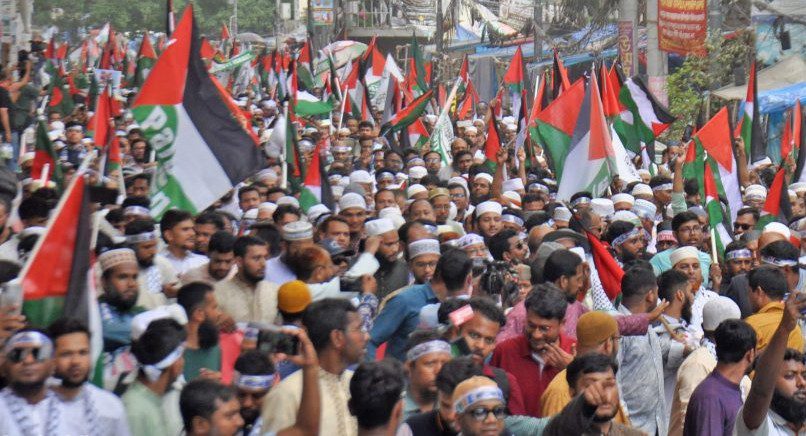Tens of thousands of people gathered in the heart of the Bangladeshi capital Dhaka on Saturday to protest what organizers described as “genocide and ethnic cleansing” in Gaza, calling for an immediate end to Israeli military operations targeting Palestinian civilians.
The rally, held at Suhrawardy Udyan, a venue for large-scale gatherings near Dhaka University, culminated in a declaration outlining five key demands, including the cancellation of all existing agreements between Bangladesh and Israel or any Israel-affiliated entities.
“Bangladesh holds a historic position on the issue of Palestine, not only from a humanitarian standpoint but also as a matter of religious conviction,” said Mahmudur Rahman, editor of a Bengali daily, as he read the declaration before the crowd.
He also urged Muslim-majority nations to sever diplomatic and economic ties with Israel, affirming Bangladesh’s solidarity with the people of Gaza.
A central demand was the reinstatement of the “Except Israel” clause on Bangladeshi passports — a phrase previously used to prohibit Bangladeshi citizens from traveling to Israel.
The clause was removed with the introduction of e-passports, prompting widespread criticism from pro-Palestinian groups.
Other key demands of the rally included: Establishing a formal government mechanism to send humanitarian and medical aid to Gaza; imposing a nationwide boycott of products from Zionist-affiliated companies across all government offices and import policies, officially protesting the persecution of Muslims and other minorities in India under the Hindutva regime, which the declaration referred to as a key ally of the global Zionist bloc and incorporating the history of Al-Aqsa Mosque, the Palestinian struggle, and Muslim resistance into the national education curriculum.
The rally was organized by Palestine Solidarity Movement Bangladesh, which had called for broad participation across political and social lines.
From early morning, people began arriving in waves—many waving Palestinian flags and carrying banners, placards, and festoons.
By midday, Suhrawardy Udyan was filled to capacity, and by afternoon, adjacent roads were swamped with people. A police official on duty estimated the crowd to be well over 100,000. Vehicular traffic in the area was effectively shut down for much of the day.
Chants of “Palestine, Palestine; Long live, long live!”, “Action to action, direct action,” and “Crush the black hand of Israel!” echoed throughout the rally grounds.
Protesters also hurled shoes at posters of Israeli Prime Minister Benjamin Netanyahu, US President Donald Trump and Indian Prime Minister Narendra Modi — a gesture regarded as strong symbolic protest across South Asian and Middle Eastern cultures.
In a poignant show of resistance, symbolic coffins and mock corpses were paraded to highlight the civilian and child casualties in Gaza.
The event also featured a prayer led by Mohammad Abdul Malek, chief imam of Baitul Mukarram National Mosque, for the victims of Israeli airstrikes.
Senior leaders from several political and religious groups, including the Bangladesh Nationalist Party (BNP), Jamaat-e-Islami, National Citizens Party (NCP), and Hefazat-e-Islam, were present alongside prominent Islamic scholars and preachers to express their support for the victims.
Security was visibly heightened, with army and police personnel manning checkpoints and conducting random searches around the perimeter of the venue.
Despite initial plans for a city-wide procession from Suhrawardy Udyan to Manik Mia Avenue in Sher-e-Bangla Nagar, organizers decided to hold a stationary rally instead.
Many participants traveled by buses, trains, and any available means to join the gathering—many of them carrying both the Bangladeshi and Palestinian flags as a mark of united solidarity.


